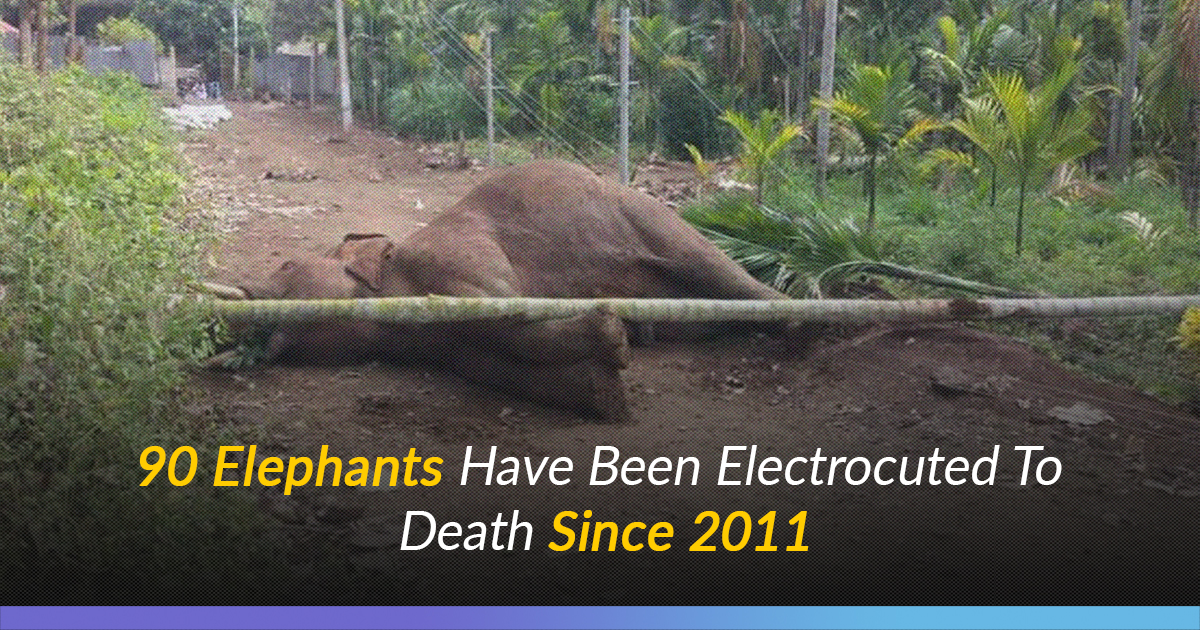On May 2, an elephant ventured out of the wetlands of Kaziranga National Park and strode towards the nearby village. However, the adventure proved to be fatal as it tried to cross an electric fence which was mounted by farmers to protect paddy fields from wild animals. The elephant died instantly.
This is not a stray instance. Shockingly, around 90 elephants in Assam have died of electrocution since 2011, according to a report released by state’s forest department. The officials have attributed the killings to the illegal electric fence and ill-maintained sagging power lines.
No relief from Elephant menace
The forest officials blame the farmers and villagers for elephant deaths. For the past couple of years, the human-elephant conflict has increased, due to which, around 1,713 humans and 373 elephants have lost their life.
As elephants started frequenting the human settlements, the farmers started installing these electric fences to protect their crops and property. The use of high voltage direct current against the norm of using low-intensity current for these fences.
The Scroll.in quoted a senior state official who said that the farmers have a wrong perception that elephants require high voltage electricity to get repulsed- due to its massive size. However in reality due to its larger surface area, a 10-volt shock is enough. But people tend to use 220-volt current from domestic lines. The aim, he says, is to repulse and not kill them.
Who to blame?
As humans encroach into the forest lands, the man-wildlife clash has become frequent in Assam. Due to its peculiar landscape, 7% of Assam’s area has been eroded by the Brahmaputra and its tributaries, pushing the human settlement into forest lands to find a dwelling. In a recent report by the government of Assam, around 22% of the forestland has been invaded by the citizens, leaving no choice to wildlife, but to enter the human settlements.
A wild #elephant in #Guwahati. Depleting forest cover is increasingly forcing pachyderms to venture into human habitats, leading to deadly human-wildlife conflicts. pic.twitter.com/xpcN0NNG0k
— Anupam Bordoloi (@asomputra) April 30, 2019
In this particular case, there exists no particular punishment for people killing wildlife through electric fences. Bibhab Kumar Talukdar, head of an NGO Aaranyak stressed on the fact that due to lack of punishment in the current system, farmers gain the courage to mount these illegal electric fences. He called these killings as deliberate murders. He further said that one reason for this attitude against the offenders is because the authority believes it is just a loss of wildlife and not human life. The electricity department is equally to blame as they barely go out for routine checks in the area. Bhaskar Chowdhury, who is head of Assam zone of the Wildlife Trust of India told Scroll.in that several electrocutions of elephants have taken place because of low-hanging power lines in the forest lands. He further said that they have handed over a list of vulnerable spots where the power lines can be seen sagged. Since 2016, there exists a task force which comprises of representatives from various department such as forest department and state electricity, but the killings have hardly stopped.
The authorities only turned their heads around when one of their staff died after coming in direct contact with the fence in Sonitpur district’s Nameri National Park in 2018. He accidentally touched a fence which was connected to a high-powered domestic line that was erected to keep elephants at bay. After these incidents, several questions were raised regarding the illegal implementation of such electric fences. Protests and awareness campaign drove the area and an FIR was finally lodged.
What can be done?
One of the primary reasons, that the farmers in the area adopt to installing these electric fences is because the government has failed to pay them the compensation for the crops destroyed by these mammals. With no other option left in hand, the farmers are forced to fend for themselves. The local authority should help in erecting these electric fences with low voltage as per the norms. The government must draw a long-term solution including educating the farmers and the villagers on how to deal with elephants that happen to chance upon human settlements.
Also Read: West Bengal: Elephant Hides Child Between Legs To Protect Her From Other Herd Members











